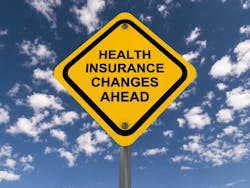Two healthcare policy leaders are calling for federal healthcare policymakers to think strategically about how to protect Americans who have obtained Medicaid coverage, once the federal Public Health Emergency (PHE) is eventually declared over by the federal government.
Writing in a blog posted last month to the website of The Commonwealth Fund, the New York City-based public policy foundation, Sabrina Corlette, J.D., a research professor and project director on health insurance at the Health Policy Institute of Georgetown University’s McCourt School of Public Policy, and Maanasa Kona, J.D., an assistant research professor at the Center on Health Insurance Reform, also at Georgetown University’s McCourt School of Public Policy, contend that the Affordable Care Act (ACA) marketplaces will serve as a critical safety net for one-third of the adults who lose Medicaid coverage once the PHE ends.
Corlette’s and Kona’s blog, published on Apr. 26 and entitled “Mitigating Coverage Loss When the Public Health Emergency Ends: The Role of the Affordable Care Act Marketplaces,” looks at the “complicated application process to transition into marketplace coverage” that people losing Medicaid coverage when the PHE ends, will have to navigate—an application process whose challenges will cause many to “fall through the cracks” without support.
As Corlette and Kona note, “In January 2020, the federal government declared a public health emergency (PHE) because of the emerging COVID-19 virus. The government has extended the PHE nine times since, and it is now scheduled to expire in mid-July 2022. Many may celebrate the symbolic end of the pandemic, but the end of the PHE could dramatically reverse recent gains the United States has made in reducing the numbers of uninsured. While the PHE is in effect, state Medicaid programs receive enhanced federal funding as long as they do not drop people from the program. At the end of the PHE, this enhanced federal funding will end and states will resume eligibility redeterminations for the more than 78 million people enrolled in Medicaid and the Children’s Health Insurance Program; as many as 16 million are expected to lose Medicaid coverage as a result.”
Those individuals have been covered by The Families First Coronavirus Response Act (FFCRA), enacted on March 18, 2020, which gave states a 6.2 percent increase in the federal share of Medicaid financing for the duration of the PHE. In exchange, states were prohibited from dropping people from the program or limiting eligibility. Subsequent federal guidance has provided states with up to 14 months after the end of the PHE to complete the necessary Medicaid eligibility redeterminations and renewals, but they must conduct a fresh review of eligibility for each beneficiary.
As the article’s authors note, “As the end of the PHE looms, advocates and government officials are primarily focused on the preparedness of Medicaid agencies, but the Affordable Care Act (ACA) marketplaces will serve as a critical safety net. An estimated one-third of adults who lose Medicaid will be eligible for subsidized coverage through the marketplaces. But whether people understand the coverage options available, apply for premium tax credits, enroll in, and ultimately use their new coverage will depend largely on marketplace officials. In most states, once the state Medicaid agency finds people no longer eligible, it transfers them to the marketplace. Then, the marketplace contacts those individuals and invites them to complete an application for a marketplace plan. To successfully transition to new coverage, the consumer must complete a number of steps within a limited, 60-day special-enrollment period.”
Importantly, the authors note, “The complexity of the application and enrollment process can mean that consumers fall through the cracks. One study found that only 5 percent of individuals terminated from Medicaid successfully enroll in marketplace plans. However, several of the 18 state-based marketplaces (SBMs) have integrated their Medicaid and marketplace eligibility and enrollment systems and may be able to provide a more streamlined experience. Marketplaces, both federal and state-run, can play a critical communications role before and after the end of the PHE. Unlike most Medicaid agencies, the marketplaces have marketing budgets and work with navigators and brokers who understand how to ‘sell’ the importance of insurance. These resources can be leveraged to educate Medicaid enrollees about the importance of renewing coverage if they’re still eligible and can help those terminated understand their options through the marketplace. New York’s marketplace, for instance, is using a PHE-focused communications campaign to help educate Medicaid enrollees about how to maintain coverage.”
Corlette and Kona note that there are some variables leading to uncertainty in this situation, primarily the fact that no one knows when the PHE will end, and also that “many state Medicaid agencies have not yet decided on the timeline and process by which they will resume eligibility redeterminations and renewals.”
The authors advocate this: “The end of the public health emergency and Medicaid’s continuous coverage requirement pose tremendous challenges for federal and state-level officials. Historic gains in health insurance coverage could quickly be wiped out. However, early planning, coordination between Medicaid and the marketplaces, investments in communications and consumer support infrastructure, and greater automation of the eligibility and enrollment process could significantly reduce that risk.”


